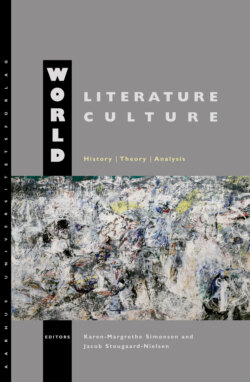Читать книгу World Literature, World Culture - Группа авторов - Страница 4
На сайте Литреса книга снята с продажи.
HISTORIES
ОглавлениеThe recent interest in world literature must be seen in relation to an historical development that gained momentum in the late eighteenth and the beginning of the nineteenth century, that is, with the outset of modernity. This development has redefined the relationship between individual Bildung and national history, between local history and global interactions. Modernity, even in its most local forms, is closely linked to a global mental space (see Svend Erik Larsen). Thus our modern mode of historical reflection, based on a certain philosophically defined humanism, the notion of national identity and the positivist method, harks back to eighteenth and nineteenth century thinking, and so does our concept of literary history, which reflects a given period’s view of the geographical and cultural context of literature. Literary histories with an international scope can be found as early as the late eighteenth century, when Juan Andrés Morell wrote his Origen, progresos y estado actual de toda la literatura (“Origin, progress and the contemporary status of all literature”, 1782-1799). For Andrés, the aim of literary history was both to restore the reputation of Spanish literature outside Spain and to reinscribe the influence of Arabic culture on European culture, thus diminishing the importance of Greek and, especially, Latin cultures (see Tomás González Ahola). Histories of world literature will inevitably favour some national literatures over others, but they are also bound to frame the understanding of national literatures within a particular worldview. The particular texts, historical lines and influences that a literary historian chooses to highlight in describing the development of a given national literature will reveal his or her implicit view of world literature.
The aim of the section entitled “Histories” is thus not only to offer pertinent perspectives on the chronological development of world literature, but also to show that the concept of world literature demands a new perspective on historical developments and on historicity as such. Historical perspectives hardly ever serve as mere background material; they are guided by the implicit aim of any given study and should themselves be seen, therefore, as the object of methodological reflection, just as any given method needs historical contextualisation. The question is how to maintain a balance.
In the mid- and late twentieth century there was a tendency within the discipline of Comparative Literature to replace historical studies of literature with philosophical reflections. French post-histoire cultural analysis and the dominant trends within postcolonial studies were highly theoretical and sceptical in their attitude towards historical narrations. Such narrations were thought to be altmodisch and for the most part too narrowly European. However, history does not simply come to a halt, and scholars of world literature need to reopen the discussion of how we can “historise” in new ways today (see David Marno). In re-evaluating our approach to history we also need to question the kinds of access the individual has to history and how such access is mediated. It is no accident that memory studies in recent years have attracted so much attention, both at the popular and the academic level, and there is a growing interest today in the related study of witness literature. The fascination of such literature lies to a large extent in the fact that the individual, particular story may mean something to a wider public and, simultaneously, offer a more general understanding of history (see Michel de Dobbeleer’s article in the “Translation” section). A parallel development in literary studies is the growing interest in the ways in which we actually experience literature. The increasing scholarly interest in the meaning of nostalgia, and especially nostalgia as presented in literature, seems to elevate personal, idiosyncratic and emotional involvement in history to a productive strategy for coming to terms with the traumatic and incomprehensible elements of our past (see Fiona Schouten).
